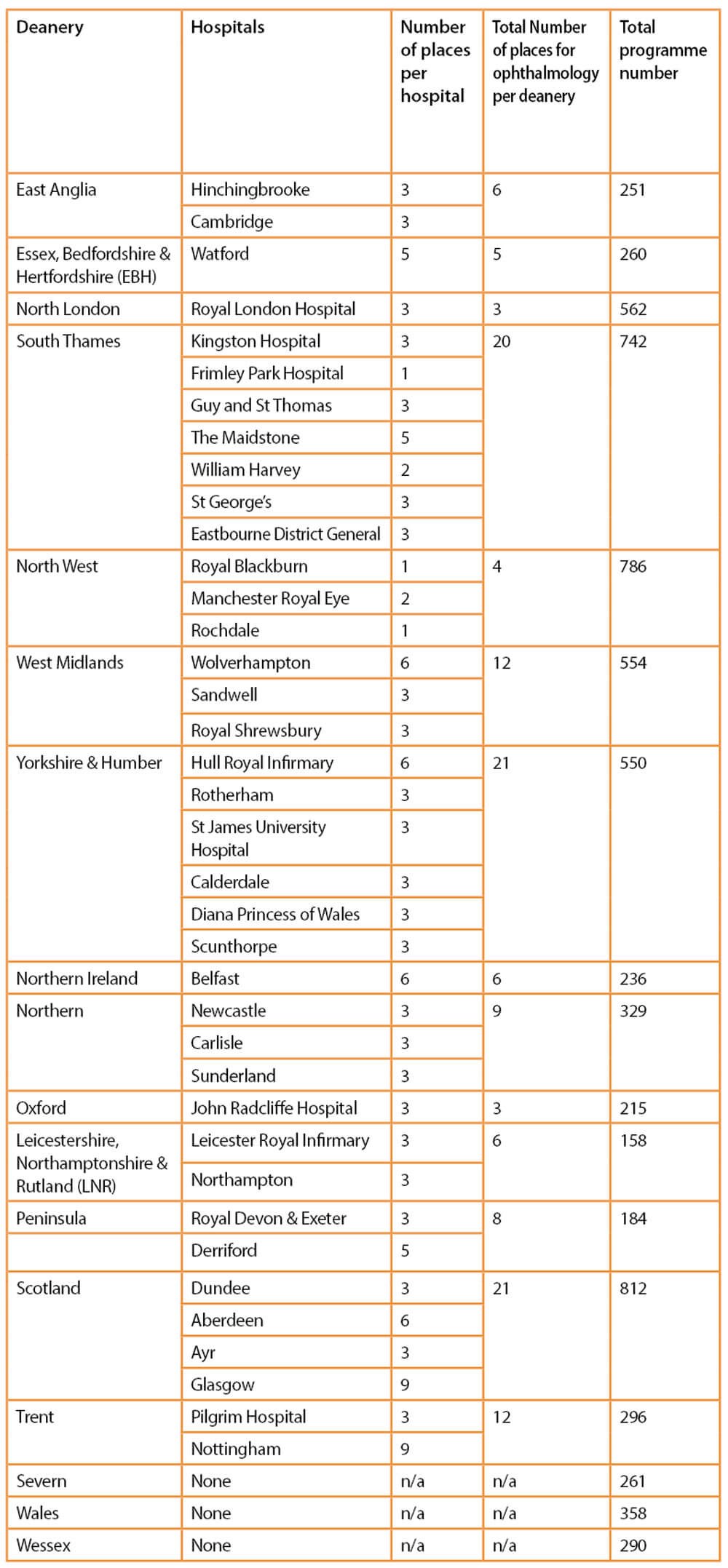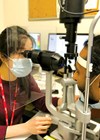
If you are in your final year of medicine at university, firstly congratulations on making it so far and secondly, you may be wondering how and which jobs to rank highly. If you have found yourself reading this article, then you likely have an idea that ophthalmology could be the specialty for you. If this is the case, then please read on for some insight into the post (spoiler: I couldn’t recommend it enough!). Indeed, even if ophthalmology as a career isn’t for you, then I would still strongly recommend a post in it for the benefits it gives you in terms of improving your clinical skills, knowledge and potential teaching, research, or audit opportunities.
Why should I do an FY2 post in Ophthalmology?
If you did not know that you could do a foundation rotation in ophthalmology, then you could easily be forgiven as the number of posts per deanery are generally few and not all foundation schools will offer a post. In this case there are many alternative ways to build up your CV during your foundation programme e.g., taster days or quality improvement (QI) / audit. However, if your dream foundation school does offer a chance to do a rotation in ophthalmology then I urge you to take the opportunity and will include the list of possible ophthalmology FY1/2 posts shortly.

A foundation doctor in ophthalmology is unsurprisingly the least qualified doctor in the department and as such the level of supervision is generally very high. Often foundation doctors will be put on a similar rotation to the ST1’s in the department and so checking reviews for departments can be helpful in determining what the post will be like. However, unlike ST1s there is no pressure for ophthalmic competency sign-off (though this is a great opportunity to learn skills!) or completion of a cataract surgery. Whilst there is a steep learning curve, having exposure to training is immensely beneficial. It not only gives you insight into training and determining whether you would enjoy the job but also gives you a crucial head start in building up competencies such as indirect fundoscopy, tonometry and history taking.

Table1: Which rotational programmes include ophthalmology?
*Based on the 2021 published list of foundation programme
per deanery, does not include AFP/FPP [3].
There is usually departmental education for trainees which often runs for a half day, and this again re-enforces the knowledge that you will build up by seeing patients diagnosed and treated in the department.
Even if you do not want to do ophthalmology as a specialty, the skills gained in eye casualty can be immensely helpful when you then go on to do your other posts and indeed further on in your career.
In my own case, I had GP and A&E posts after my ophthalmology job and I saw many clinicians avoid, panic, or inappropriately refer patients with an eye problem (which can be up to six percent of Accident and Emergency (A&E) patients) [1].
In my four months on an Ophthalmology placement, I had gained enough experience to feel confident in history taking, examining, formulating a working diagnosis and early management and referring. Appropriate referrals and management in A&E were especially often poor amongst junior staff. This is unsurprising considering some universities do not offer ophthalmology placements and, even if they do, placements are often for a short period, with an average of 7.6 days [2]. Gaining the knowledge and confidence in managing acute eye problems can be incredibly useful and rewarding in subsequent jobs and for peer-to-peer teaching.
What foundation posts are available?
In your final year of medical school, you will be nominated by the school in August and invited to register and apply to the foundation programme. You will then be asked to rank all 19 foundation schools across the UK in order of preference by February (16/02/2023 for this year’s cohort). In March (09/02/2023) applicants will be matched with a foundation school and asked to then rank their rotational programme in order of preference.
How to make the most out of your foundation rotation
Not only is the post useful for your clinical acumen but it can also give some all-important portfolio points.
Possible portfolio points to be gained:
- FRCOphth Part 1 (weekly departmental teaching / four-month exposure can improve your chance of passing)
- Non-peer reviewed publications and case reports in ophthalmology
- Attending ophthalmology clinics and theatre sessions
- EyeSi assesments
- Ophthalmology simulation training (most hospitals / trainees will have access to the EyeSi - Eye Simulation, some may also have a wet lab or other surgical skill training)
- Attending regional / national ophthalmology educational meetings.
- Publications / research / poster presentations.
- QI / Audit
- Education and teaching – often there is an opportunity to formally teach medical students or peer teaching in weekly departmental training.
These are not guaranteed points and not all posts will offer the above. However, networking with consultants and opportunities for many of these are far easier from within the ophthalmology department.
My experience: Leeds Teaching Hospitals
I did a Foundation Year 2 post in ophthalmology at St James University Hospital, Leeds. Before the placement I was dreading this rotation. Having only done a week of ophthalmology in third year I was very worried about my lack of knowledge and experience undertaking an SHO role in this department. I also thought, at that time, that I would like to specialise in anaesthetics and so was surprised when I found myself much more interested in the operation than the anaesthetic side. Although I wasn’t able to perform intraocular surgery, I regularly went to the oculoplastic list and was able to suture on patients for the first time.
I was pleasantly surprised when I actually started my ophthalmology post. Whilst eye casualty and on-call shifts can be challenging and high-pressure, there were always senior members of the team present to help. The post itself was supernumerary and followed a similar pattern to the ST1 rota, and as such there was a sharp learning curve, but this was very much cushioned with senior support and teaching. The team were generally very supportive, friendly, and encouraging of my application to ophthalmology. Applications themselves are extremely competitive with a 9:1 applicant to places ratio, and it can be very difficult to obtain the necessary points to gain a training place [4]. Therefore, prioritising a foundation post can ensure a head start in obtaining those all-important portfolio competencies.
This post ultimately made me want to do ophthalmology (when I had never even considered it), which I think is a testimony to how great the job was. If, like I was, you are currently unsure about your future careers and ranking your foundation jobs, I would really recommend trying to get an ophthalmology foundation job. The rotation I did was my 12th choice of rankings and I stumbled into ophthalmology quite by accident! So, whilst it may feel daunting having so few ophthalmology jobs per rotation it is absolutely within your grasp. In addition, please don’t feel disheartened if you don’t have an ophthalmology job in FY1 or FY2. You can still gain all the points you need to, having an FY post alone does not count towards points (though it can certainly help). Good luck to all of you currently applying to foundation schools!
TAKE HOME MESSAGE
-
A foundation post in ophthalmology can improve your portfolio and application for ophthalmology.
-
Some deaneries do not offer ophthalmology posts, but most have a small number of ophthalmology posts.
-
Foundation post timetables tend to be similar to ST1’s which can offer insight into the job.
-
You don’t have to have an incredible situational judgement test / medical school score to obtain an ophthalmology post, it is often to do with luck / competition that year (not everyone will prioritise it!).
References
1. Edwards RS. Ophthalmic emergencies in a district general hospital casualty department. Br J Ophthalmol. 1987;71(12):938-42.
2. Baylis O, Murray PI, Dayan M. Undergraduate ophthalmology education - a survey of UK medical schools. Med Teach 2011;33(6):468-71.
3. 2023 Foundation Programme Guide.
https://foundationprogramme.nhs.uk
4. Competition Ratios for specialty training 2022.
https://medical.hee.nhs.uk/medical-training-recruitment/
medical-specialty-training/competition-ratios/2022-competition-ratios
[All links last accessed January 2023].
COMMENTS ARE WELCOME









